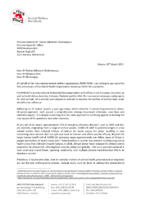
One year after COVID-19 was declared a pandemic by the WHO:
FOUR PAWS calls on responsible organisations and governments to improve the human-animal relationship to prevent future pandemics
10 March 2021 – On 11 March 2020, the World Health Organisation (WHO) officially declared the COVID-19 outbreak a pandemic. In light of the anniversary, global animal welfare organisation FOUR PAWS calls on the WHO, OIE (World Organisation for Animal Health) and FAO (Food and Agriculture Organisation of the United Nations) to lead global efforts in stopping the next pandemic and adopt a One Health and One Welfare framework. The open letter further outlines key strategies to combat zoonotic diseases. According to an UNEP (United Nations Environment Programme) report from 2020, 75 percent of all emerging infectious diseases originate in animals, including COVID-19.
From factory farming to live animal trade and fur farms
To prevent zoonotic pandemics in the future, FOUR PAWS asks that the WHO, OIE, FAO and responsible governments stop focusing on interim pharmaceutical solutions while not addressing the actual issues around animal abuse. Sustainable solutions that begin with the banning of fur farms, live animal markets, the wild animal trade and the dog and cat meat trade are required. Furthermore, factory farming must be eradicated and the reduction of meat consumption must be promoted. This will also ensure that wild animals' habitats are not further destroyed, and that the climate crisis is no longer fueled. Neglecting animal welfare and environment health at the expense of growth has led to a dangerous imbalance. Deforestation has expanded the boundaries between human settlements and wildlife habitat, where infectious diseases evolve and spread most easily from wild animals to humans.
Ticking time bombs all over the world
International experts believe that the novel coronavirus originated in wild animals and was transmitted to humans through an animal intermediate host potentially at a live animal market in Wuhan, China. According to FOUR PAWS research, live animal markets are often completely overcrowded and underregulated. Animals of different species, such as pangolins, snakes, dogs, and cats, are held in extremely unsanitary conditions, crammed into confined spaces, and brutally slaughtered for their meat. The cruel and outdated conditions lead to weakened immune systems, pathogen transfer and greater chances of emergence of novel pathogens, which increases the risks for humans.
Note: Any advertisements that may appear during the viewing of this video are unrelated to FOUR PAWS. We assume no liability for this content.

